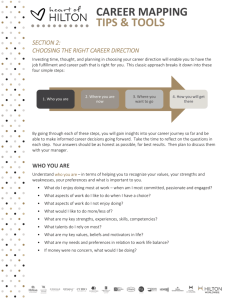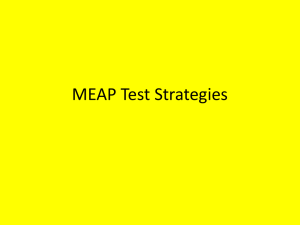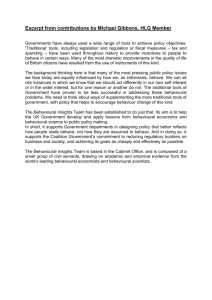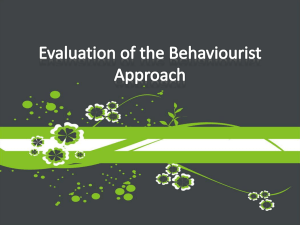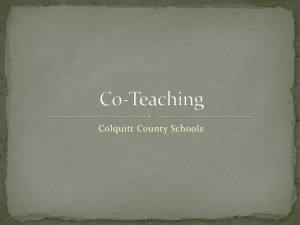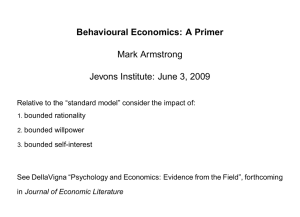for LTA submission
advertisement
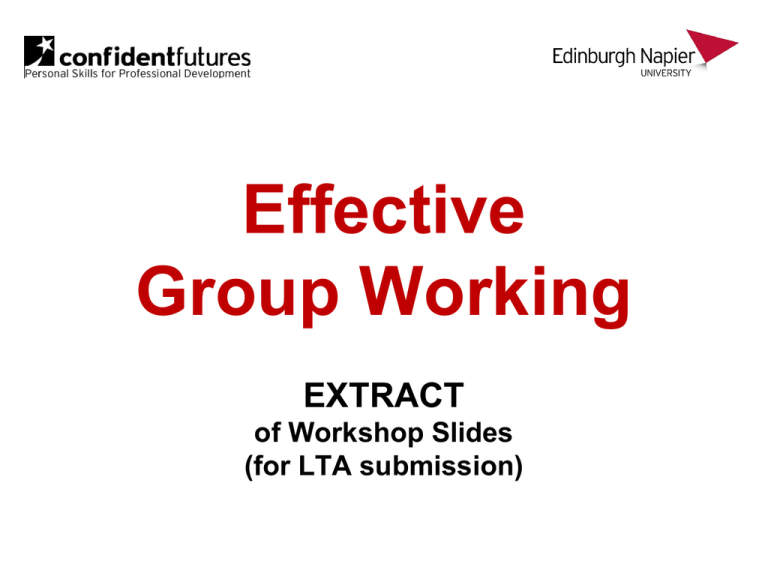
Effective Group Working EXTRACT of Workshop Slides (for LTA submission) Coursework - Group Presentation • Group work task. Groups will be assigned today • Task - Analyse the components of fitness and the principles of training as they apply to a sport of your choice. - Propose a suitable training programme for an athlete of your choice, to conduct over 8 weeks. • Submission Week 12 10 minute presentation (50%) A discussion process with the tutor will be held after the presentation and students awarded a percentage of the grade depending on input. This photo is licensed under a Creative Commons Attribution Non-Commercial Share-Alike license What you will learn in this Workshop Learn a useful framework for understanding your own and others’ behavioural preferences Understand your preferences in working style, response to change, deadlines, decision-making and communication Use this knowledge to identify your personal strengths and weaknesses as a team member Learn to apply this understanding to work effectively as a Project Group SUMMARY: WORKSHOP SECTION 1 Students: • are introduced to a Behavioural Model • Identify their own behaviour tendencies and preferred ways of working and how that may differ from others • Understand how that may impact role allocation, communication styles, decision making and conflict management within groups • Consider the impact of these different styles on effective group working Strengths and Weaknesses Consider your ‘preferred behavioural style’, and: 1. identify 3 ways in which it makes a positive contribution to the group work and presentation 2. Identify 3 ways in which it might cause problems in group work and presentation 3. Describe what kind of team leader you might make? Create a poster listing all of above Effective project groups Move into your project groups SUMMARY: WORKSHOP SECTION 2 Students: • are allocated working groups • Apply the behavioural model to their ‘group profile’ • Consider the implications (positive and negative) of that on group dynamics and execution of the processes and tasks required within the Group Task • Agree some ways of working, groundrules and conflict management approaches Team Evaluation Q - what are the strengths of our team profile? Q - what are the weaknesses of our profile? Now add the main points to your team colour profile poster. Ground rules: In view of your team profile, create a series of agreed ground rules to ensure your team is successful in: meeting management time management and communication. Now add the main points to your team colour profile poster. Examples of Ground Rules • Set deadlines and stick to them • Share information by email • Notify people in good time if can’t make meeting or other deadline • Everyone to speak at meetings • Warn problem members before Tutor is notified • Meetings to start and finish on time • Agendas will follow a particular format • Notes will be kept by particular individual or take it in turns • Meetings will be chaired by particular individual or take it in turns One of the ground rules at a golf course in Nairobi:A ball lying less than 10 yards from a lion need not be played! What you will learn in this Workshop Learn a useful framework for understanding your own and others’ behavioural preferences Understand your preferences in working style, response to change, deadlines, decision-making and communication Use this knowledge to identify your personal strengths and weaknesses as a team member Learn to apply this understanding to work effectively as a Project Group Reflection and evaluation Please complete the Personal Learning Outcomes in your Workbook p 12 This will help your reflection on your own behaviour and the overall group dynamics in your final assessment We hope you found this workshop useful. We value honest, constructive feedback. Please take a few minutes to complete a feedback form.
